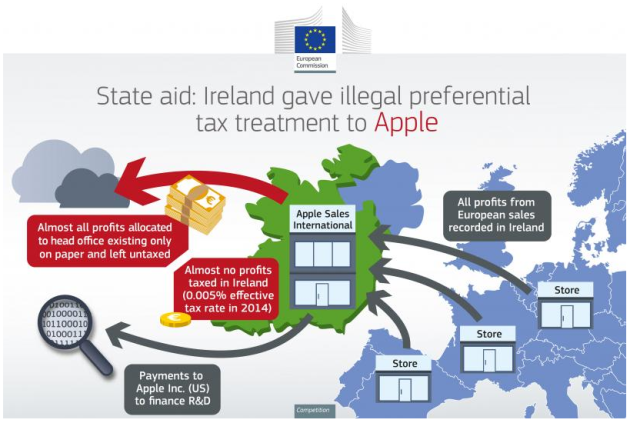
The European Commission has ordered Apple pay a mammoth €13 billion ($19.2 billion) plus interest in lost tax revenue after ruling it received a tax break in Ireland that amounts to illegal state aid.
It is the largest crackdown on what is commonly known as a sweetheart deal in the region, with a bill 40 times greater than the previous record.
Both Apple and the Irish government intend to appeal the ruling with the tech giant warning it will cost Irish jobs, a common threat in such cases.
EU competition commissioner Margrethe Vestager said Apple’s tax arrangement in Ireland, in which it has paid a maximum tax rate of 1% on profits derived from European sales since 1991, amounts to illegal state aid. In 2014, Apple paid a tax rate of 0.005% when the usual corporate tax rate in the country is 12.5%.
"Member states cannot give tax benefits to selected companies – this is illegal under EU state aid rules. The Commission’s investigation concluded that Ireland granted illegal tax benefits to Apple, which enabled it to pay substantially less tax than other businesses over many years," Vestager says.
"In fact, this selective treatment allowed Apple to pay an effective corporate tax rate of 1 per cent on its European profits in 2003 down to 0.005 per cent in 2014."
Apple’s European headquarters in Ireland, where it books all sales across the EU. After Apple pays tax in the country profits are then shifted to a tax haven abroad, accoording to a EC diagram (below).

Both Apple and the Irish government have vigorously defended the arrangement and say they will appeal.
Irish finance minister Michael Noonan said he disagreed profoundly with the commission's decision and that Ireland's tax system is founded on the strict application of the law.
Apple said the EC was trying to "rewrite Apple's history in Europe, ignore Ireland's tax laws and upend the international tax system in the process".
"The commission's case is not about how much Apple pays in taxes, it's about which government collects the money," the tech giant said in a statement.
“It will have a profound and harmful effect on investment and job creation in Europe. Apple follows the law and pays all of the taxes we owe wherever we operate. We will appeal and we are confident the decision will be overturned."
For the Irish government, offering favourable tax arrangements, or sweetheart deals, is a way to attract global businesses to base their European operations in the country.
The EC has been investigating the voracity of multinational tax avoidance schemes that it says illegaly shifts profits made in the European Union into tax havens abroad.
Such practices are usually structured within the frameworks of the law, but several regulators around the world are cracking down on avoidance schemes that they regard as thiny veiled tax evasion.
In recent years, Google, Amazon and Starbucks have fallen foul of British authorities for paying little or no tax on huge profits.
Starbucks, and to a lesser degree Amazon, suffered a minor hit to their reputation, with some consumers avoiding their businesses, but whether this is likely to have a similar effect on Apple remains to be seen.
Ireland is not the only country in Europe to offer such schemes. Switzerland, which is a part of Europe but falls outside the EU, and Luxembourg are well established tax havens, while several Caribbean islands offer favourable tax regimes where multinational businesses exist only on paper.
In the US, Dellaware acts as one of the largest (and least known) tax havens in the world.
Have something to say on this? Share your views in the comments section below. Or if you have a news story or tip-off, drop us a line at adnews@yaffa.com.au
Sign up to the AdNews newsletter, like us on Facebook or follow us on Twitter for breaking stories and campaigns throughout the day.


